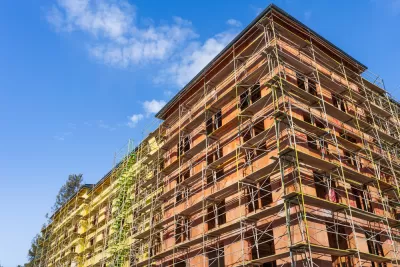How local attitudes toward zoning reform hinder efforts to boost housing production.

In a piece in City Journal, Christopher S. Elmendorf, Clayton Nall, and Stan Oklobdzija describe the results of a survey that assessed the factors Americans blame for high housing costs, noting that many respondents expressed skepticism that upzoning initiatives would lower housing costs. Unlike other consumer goods, in the minds of many Americans, housing does not respond to the normal pressures or supply and demand. This makes zoning reform that is more permissive to higher density housing and new construction an uphill battle in many communities.
“Asked to think about their city’s future, the vast majority of respondents across two surveys—Republicans and Democrats, homeowners and renters—say that they wish home prices and rents were lower. But they don’t generally subscribe to the other half of the elite consensus: namely, that restrictive zoning is to blame for high prices.” In other words, “We find that most people simply don’t believe that increasing housing supply would lower prices.” According to the authors, “Across all the survey variations, only a minority of respondents predicted that a large, positive supply shock would exert downward pressure on home prices and rents.”
The authors add, “We asked respondents to designate up to three actors as being ‘responsible for high housing prices and rents in your area.’ Developers and landlords took the brunt of the blame; environmentalists and anti-development activists got off scot free.” Ultimately, “[the] study suggests that states have done little because there’s not yet widespread public support for preemptive state up-zoning.”
FULL STORY: Folk Economics and the Politics of Housing

Planetizen Federal Action Tracker
A weekly monitor of how Trump’s orders and actions are impacting planners and planning in America.

Map: Where Senate Republicans Want to Sell Your Public Lands
For public land advocates, the Senate Republicans’ proposal to sell millions of acres of public land in the West is “the biggest fight of their careers.”

Restaurant Patios Were a Pandemic Win — Why Were They so Hard to Keep?
Social distancing requirements and changes in travel patterns prompted cities to pilot new uses for street and sidewalk space. Then it got complicated.

California Homeless Arrests, Citations Spike After Ruling
An investigation reveals that anti-homeless actions increased up to 500% after Grants Pass v. Johnson — even in cities claiming no policy change.

Albuquerque Route 66 Motels Become Affordable Housing
A $4 million city fund is incentivizing developers to breathe new life into derelict midcentury motels.

DC Area County Eliminates Bus Fares
Montgomery County joins a growing trend of making transit free.
Urban Design for Planners 1: Software Tools
This six-course series explores essential urban design concepts using open source software and equips planners with the tools they need to participate fully in the urban design process.
Planning for Universal Design
Learn the tools for implementing Universal Design in planning regulations.
Heyer Gruel & Associates PA
JM Goldson LLC
Custer County Colorado
City of Camden Redevelopment Agency
City of Astoria
Transportation Research & Education Center (TREC) at Portland State University
Camden Redevelopment Agency
City of Claremont
Municipality of Princeton (NJ)





























